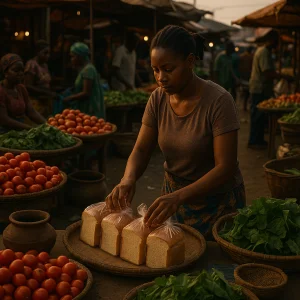
Digest
As food inflation pushes 41%, Nigerian families face unprecedented challenges in feeding their households. From half loaves of bread in urban bakeries to strategic market timing in local communities, citizens are developing creative approaches to sustenance that balance nutrition, safety, and stretched budgets.
Survival strategies emerging across communities:
- Strategic market timing – late evening shopping yields discounts on perishables as sellers avoid losses
- Building relationships with vendors for preferential pricing and quality assurance
- Community purchasing collectives that split bulk items and reduce individual costs
- Creative meal planning that stretches animal protein with local, nutrient-dense vegetables
- Careful food storage solutions that work despite power constraints
- Vigilance against reprocessed spoiled foods that pose serious health risks
- Alternative cooking methods that conserve fuel while ensuring food safety
How is your family adapting to these difficult times? What market wisdom or cooking innovations have you discovered? The guidance below offers strategies for surviving this crisis with dignity, but your community knowledge may hold solutions others haven't yet discovered.
Explore Complete Guide Below:
The New Reality of Feeding a Family in Nigeria
In markets, neighbourhood shops, and homes across Nigeria, a quiet revolution in food management is unfolding. As inflation pushes basic nutritional staples beyond reach for many families, Nigerians are developing sophisticated strategies to maintain nourishment and dignity despite dwindling resources.
The half loaf of bread—now a common sight in bakeries nationwide—stands as just one visible symbol of a much deeper transformation in how families approach their most basic need: feeding their loved ones.
Many parents report facing impossible calculations each morning: whether to buy half the usual quantity of higher-quality food, or the same amount of lower-quality alternatives. These aren't choices any parent should have to make, yet they've become daily realities for countless Nigerian households.
With food inflation exceeding 40% according to the National Bureau of Statistics, these dilemmas have become the norm rather than the exception for Nigerian families.
Strategic Market Navigation: Timing, Relationships, and Knowledge
The Power of Timing
While supermarkets maintain fixed prices throughout the day, traditional markets offer opportunities for strategic shopping that many families are rediscovering.Observations across markets in several states reveal a growing pattern: shoppers arriving between 5:30-7:00pm often secure perishables like tomatoes, leafy greens, and even some fish at 30-40% discounts as sellers prepare to close and prefer making some profit to taking losses on unsold goods.
However, early morning shopping has its own advantages, particularly for those seeking the freshest produce or items that typically sell out by afternoon.
Building Vendor Relationships
In this economic climate, personal relationships with market vendors have become invaluable social currency.Regular market-goers report developing almost familial relationships with certain vendors who may keep quality produce reserved for loyal customers. These relationships extend beyond mere transactions—many involve checking on each other's families and sharing struggles.
These connections provide more than just preferential treatment; they offer crucial quality assurance in a time when food safety concerns have increased.
Avoiding Dangerous Alternatives
The economic pressure has unfortunately led to concerning practices in some markets, with instances of vendors attempting to sell reprocessed foods that have spoiled and been inadequately restored.Health professionals note increased cases of foodborne illness, particularly concerning reprocessed fish treated with chemicals to mask spoilage, and meats sold from animals that died rather than being properly slaughtered.
Community knowledge sharing has become essential in identifying safe vendors and warning others about dangerous sources. WhatsApp groups in many neighborhoods now function as informal consumer protection networks.
Home Economics: Storage, Preparation, and Maximization
Creative Storage Solutions
With electricity supply unreliable and increasingly expensive, preserving food presents particular challenges for Nigerian families.Innovative Approaches Include:
- Clay pot cooling systems for vegetables that require no electricity
- Charcoal refrigeration boxes that extend produce freshness by 2-3 days
- Strategic parboiling techniques that allow certain foods to remain safe longer
- Dried food alternatives that provide similar nutrients with extended shelf life
Nutrient Maximization
Nutritional research indicates that many traditional Nigerian preparation methods actually preserve more nutrients than modern approaches, making them doubly valuable in this crisis.
Studies from several Nigerian universities suggest that traditional leafy green preparation, where vegetables are quickly blanched rather than long-boiled, retains up to 60% more vitamins. What was old is becoming new again as families rediscover these methods out of necessity.
Stretching Protein Sources
With animal protein increasingly unaffordable, families are finding creative alternatives to ensure adequate nutrition.Protein Stretching Strategies:
- Using crayfish powder to enhance flavors while adding protein to vegetable dishes
- Fermenting locust beans (iru) for high-protein flavor enhancement
- Increasing bean portions and preparations beyond traditional recipes
- Incorporating more eggs as more affordable animal protein alternatives
Community Solutions: Collective Power
Perhaps the most promising development has been the emergence of community-based solutions that leverage collective purchasing power.Buying Cooperatives
Informal purchasing groups have sprung up nationwide, allowing families to access bulk pricing previously available only to businesses.Reports from several urban centres describe estate-based food cooperatives forming with 10-20 families who pool funds weekly to purchase 50kg bags of rice, beans, and other staples directly from wholesalers, then divide them. These arrangements often save members 20-25% compared to market retail prices.
These cooperatives frequently expand beyond just purchasing to include knowledge sharing about food preparation, preservation techniques, and health information.
Seed and Plant Exchanges
Urban gardening has experienced a renaissance, with available land—however small—increasingly dedicated to food production.In neighbourhoods across Nigeria, residents are converting backyards and available spaces to growing vegetables like ugu, bitter leaf, and scent leaf. Some communities have established plant exchanges where neighbours swap cuttings and seedlings, resulting in impressive collective food production despite individual space limitations.
Looking Forward: Dignity Amid Difficulty
The current food security challenges facing Nigerian families cannot be overlooked or minimized. The struggle is real, often devastating, and reflects broader economic policies and realities that require urgent attention.Yet amid these difficulties, communities are demonstrating remarkable resilience and ingenuity—not because the situation is acceptable, but because survival demands adaptation.
Many families express that they shouldn't have to be this creative just to eat. Yet until conditions improve, they continue finding ways to nourish their families and maintain dignity. Perhaps some lessons from this difficult period—the community connections, the rediscovery of traditional wisdom—will remain valuable even when better days return.
Community Wisdom
How is your family navigating these challenging times? What market knowledge, preparation techniques, or community solutions have you discovered? Share your experiences below—your insights might provide exactly what another family needs to hear today.




